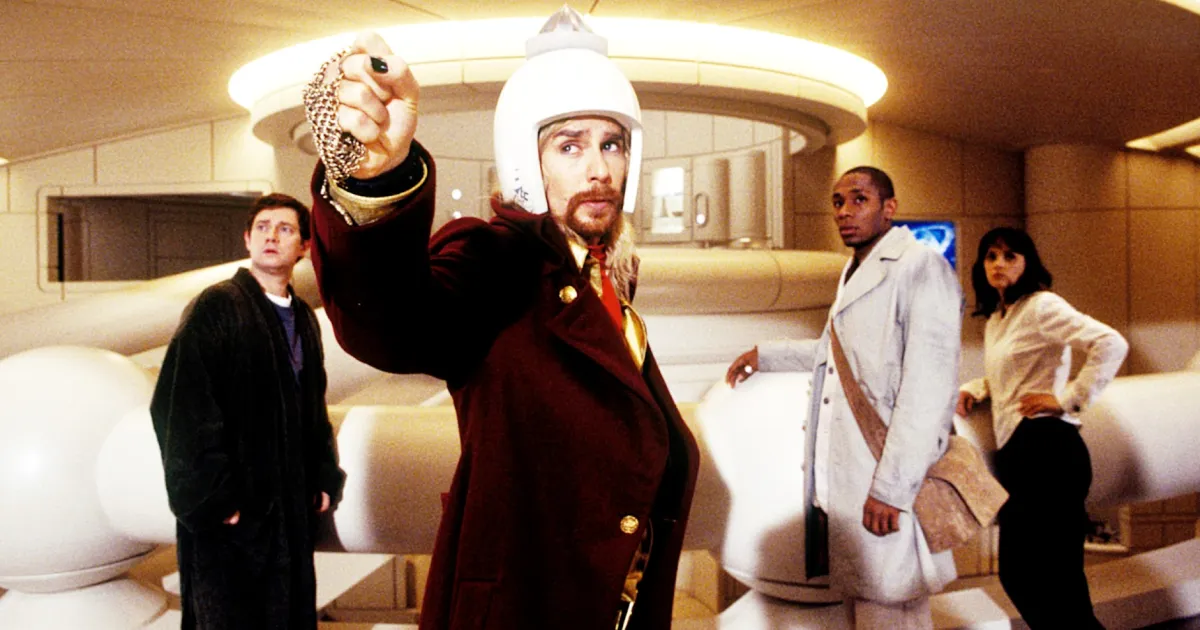
This sci-fi comedy from 2005 is based on the popular series of novels of the same name by Douglas Adams. Directed by Garth Jennings (Sing), The Hitchhiker’s Guide to the Galaxy follows an average, every-day Englishman named Arthur Dent (Martin Freeman) whose home is on the verge of being bulldozed, when he’s suddenly whisked away to space by his friend Ford Prefect (Mos Def) — who also happens to be an alien. There, the two embark on a bizarre journey across the galaxy, seeking the meaning of life.
In addition to Def and Freeman, The Hitchhiker’s Guide to the Galaxy features several hilarious performances from notable stars, including Sam Rockwell, Alan Rickman, Zooey Deschanel and John Malkovich. The quirky humor, impressive practical effects and puppets courtesy of Jim Henson’s Creature Shop make this an exceedingly entertaining film even if you aren’t familiar with the source material.
In this cult classic, teenager Donnie Darko (in a breakout role for Gyllenhaal) narrowly avoids a freak accident from a fallen jet engine but is plagued by visions of a man in a bunny suit named Frank (James Duval), who tells Donnie one night that the world is going to end in 28 days. Is Frank merely a specter in Donnie’s head, or is the apocalypse imminent?
Richard Kelly’s enigmatic sci-fi indie served as the filmmaker’s daring directorial debut. Ambitious and original, Donnie Darko is a classic of coming-of-age cinema as well as a truly twisted psychological thriller, exploring ideas about time travel, mortality, isolation and free will.
You think your work day is bad? It pales when you compare it with what Andy (Hamilton‘s Anthony Ramos) is going through. A space miner by day, his ship breaks down and crashlands on an alien planet. To make matters worse, his suit’s AI is malfunctioning and his oxygen is running out. His only hope lies in a stranger, Naomi (Naomi Scott), but first, she needs him to help her leave her damaged escape pod that’s nearby. It will get worse before it gets better for Andy — and that’s the best case scenario!
Long Distance is a captivating indie sci-fi movie that works as a small-scale tale of survival. The stakes aren’t high for Andy; he doesn’t need to save the world, just Naomi and himself. But if you were in Andy’s shoes, that would be more than enough to get your heart racing. That’s why Long Distance is so effective — it puts you up close and personal with a man running out of luck and time.
Before James Cameron conquered water with his Avatar movies, he first took a dip into Earth’s deep oceans with The Abyss, a 1989 sci-fi adventure that utilized groundbreaking visual effects that were later developed in Terminator 2: Judgment Day. When a U.S. submarine encounters an unidentified floating object in the Atlantic Ocean, a team of Navy SEALs is sent to a nearby drilling rig to investigate.
Tensions mount as estranged couple Budd (Ed Harris), who is the captain of the rig, and Lindsey (Mary Elizabeth Mastrantonio), who is obsessed with confirming the existence of alien intelligent life, clash over whether they should risk injury or death to find out what hit the submarine. As a hurricane approaches on the surface, everyone on the rig must either band together or fight on their own for survival.
The Abyss is less an alien invader story and more of a thriller that speculates what alien life would actually look and sound like if it first appeared underwater. The movie is more human drama than sci-fi extravaganza, but when the aliens do arrive, it’s still impressive and inspires the kind of awe that’s missing in movies nowadays.
Sometime in the near future, population control is now enforced through a procedure known as “The Assessment.” If any couple wants a child, they have to endure a rigorous series of tests to determine whether they are fit to be parents.
Mia (Elizabeth Olsen) and Aaryan (Himesh Patel) desperately want a child, so they agree to be inspected by Virginia (Alicia Vikander), a government employee charged with determining if they are mentally and physically able to raise a healthy child. But soon, Virginia’s methods become less professional and more harmful as she tests Mia and Aaryan’s love for one another. Mia doesn’t think Virginia has their best interests at heart and wants to find out what the inspector is up to. Virginia has a secret she’s desperate to hide, and it could cost Mia more than a child.
The Assessment is a somber movie that works as both a sci-fi flick and a thriller. It will keep you guessing as to what Virginia is up to, or why Mia is so intent on having a baby. The film’s portrait of a dystopian future is strikingly original, and the ending is one you won’t forget soon.
What would you give to start over and correct past mistakes? That’s the question posed to Rhoda (Brit Marling) early on in Another Earth, an underrated 2011 sci-fi movie. She was once a brilliant student with a bright future, but she caused a car accident that put a man, John (William Mapother), into a coma and killed his family. Years later, she masquerades as a maid to get close to him, and they begin an affair. He doesn’t know her real identity, and Rhoda is reluctant to tell him. But how can they both heal and move on without facing the reality of their shared past and the uncertainty of their future?
A possible solution lies in, you guessed it, another Earth that contains alternate versions of everyone on regular Earth. What if John’s family is still alive on that planet? If Rhoda helps him travel to that planet, will she finally forgive herself for the mistake she made all those years ago?
Another Earth is a throwback to those old sci-fi movies that ask big questions and don’t provide easy answers. It uses its sci-fi concept to probe the limitations of humanity, but also its greatest strengths, too.
This highly stylized auteur film is written and directed by Justin Benson and Aaron Moorhead, who also star as two neighbors who witness supernatural events in their Los Angeles apartment building. The two slackers soon realize that documenting the paranormal could inject some fame and fortune into their wasted lives. What follows is a thought-provoking and innovative film that blends elements of mystery, psychological thriller, and cosmic horror.
With its intricate plot, surreal visuals and low-budget approach, Something in the Dirt makes the most of its limited resources, creating a narrative that focuses on characters and keeps the audience guessing.
A sci-fi comedy film from King of the Hill creator Mike Judge, Idiocracy is a clever social satire that takes the “future dystopia” and reconstructs it with comedy. The film stars Luke Wilson as Joe and Maya Rudolph as Rita, two average Americans selected to participate in a top-secret government hibernation experiment. They wake up 500 years into the future to a society that has evolved into a utopian nightmare, where intelligent people are discouraged from reproducing and stupidity is the default, preferred state of being. Dax Shepard also stars as Frito, a character who represents the average citizen in this dystopian world.
It falls to Joe and Rita to save this failing society, since they are now the smartest people alive. Idiocracy turned out to be quite a prescient film, as some of the 2006 trends it mocks feel even more relevant in today’s society. It cleverly critiques issues such as consumerism, anti-intellectualism and corporate control.
As AI becomes more and more prominent in our real lives, it may be more than a little bit terrifying to watch movies about androids that decimate human society. If you can push past that fear, check out Mother/Android, a dystopian film starring Chloë Grace Moretz as Georgia, a pregnant woman seeking a safe place to have her baby with her partner Sam (Algee Smith).
While the narrative centers on survival and personal growth, the performances help ground the sci-fi elements in human emotion and urgency. The film’s exploration of technology and its impact on human life delivers a narrative that is both thought-provoking and thrilling, making Mother/Android a compelling watch for fans of the genre.
While this Disney film was a box office flop when it first premiered, it’s since developed a cult following, especially among sci-fi enthusiasts. It takes the classic tale of Treasure Island and resituates it in space. Young Jim Hawkins (voiced by Joseph Gordon-Levitt) embarks on a journey to find the legendary Treasure Planet. Joining him are Brian Murray as the charming yet duplicitous cook, John Silver, and Emma Thompson as the no-nonsense Captain Amelia. Martin Short provides comedic relief as the voice of B.E.N., a quirky and malfunctioning robot.
The narrative follows Jim as he discovers a map to a legendary planet said to be laden with untold riches, setting the stage for a classic adventure filled with treachery, camaraderie, and self-discovery. Young sci-fi fans who aren’t ready for the violence of Prey or 28 Weeks Later will find in Treasure Planet an excellent, family-friendly intro to the genre.
Despite not technically being about zombies, the 28 Days Later franchise is credited by many as reinvigorating the zombie genre with its films about terrifying victims of a deadly “Rage Virus.” This film, the second in the franchise, takes place in the UK as the country attempts to rebuild after all those infected with the Rage Virus appear to have died.
Don (Robert Carlyle), a father who abandoned his wife in the first outbreak, and his two children are part of the resettlement efforts, but when the virus sneaks its way past the barriers, chaos takes hold. Sci-fi fans, particularly those interested in dystopian futures and viral catastrophe narratives, will appreciate the film’s ability to convey tension and fear through its realistic depiction of societal breakdown and human survival.
The movie also delves into themes of moral ambiguity and the effects of trauma, providing a narrative depth that enhances the typical zombie-horror framework with thoughtful sci-fi elements.
A sci-fi romantic comedy for our AI-centric times, Robots stars Jack Whitehall and Shailene Woodley as a womanizer and a gold-digger who use their robot doubles to do the hard work of seduction. Unfortunately for them, their robot doubles fall in love and take over their lives. Through a series of humorous and often absurd adventures, the film explores themes of identity, personal responsibility, and the implications of artificial intelligence in a light and entertaining manner. The unique premise and comedic elements make Robots a refreshing addition to the sci-fi comedy landscape, providing a fun watch for audiences looking for something different.
Science fiction fans will appreciate the speculative elements surrounding the ethical and social implications of humanoid robots, while comedy lovers will enjoy the film’s witty dialogue and comedic timing. Great for fans of near-future films like Her, Robots takes a fun, silly approach to the idea of robots replacing humans, encouraging viewers to laugh and think simultaneously.
This latest installment in the long-running Planet of the Apes saga is a worthy successor, featuring excellent world-building and rich allegory. It’s a stand-alone story, perfect for those who aren’t familiar with the intricacies of the franchise. Set generations after Caesar’s reign, when apes have become the dominant species and humans live in the shadows, Kingdom stars Owen Teague as Noa, a young ape from a peaceful clan.
Alongside a mysterious human named Mae (Freya Allan), Noa embarks on a perilous journey after his village is attacked by a tyrannical ape leader named Proximus Caesar (Kevin Durand). As he gets to know Mae, Noa begins to question what he’s learned about the past and ponder the future of his species.
Directed by Wes Ball (The Maze Runner), Kingdom of the Planet of the Apes uses stunning visual effects to explore timeless themes like power, identity, and coexistence, all wrapped in a post-apocalyptic setting teeming with intrigue and action.
A prequel to the 1987 film Predator, Prey is a historical sci-fi story about an early encounter with the titular aliens. (The aliens in question are fond of hunting humans as trophies.) Prey takes place in 1719 and follows Naru (Amber Midthunder), a young Comanche woman who longs to become a hunter instead of a healer. When a Predator lands on Earth, eager to hunt down and kill humans, it’s up to Naru and her brother Taabe (Dakota Beavers) to stop the creature. Naru must hunt the Predator to protect her tribe. At the same time, her tribe comes into conflict with French fur traders who are destroying the local population of buffalo.
Naru is an inspiring protagonist — a powerful fighter with a fierce will and determination. Midthunder’s performance is intense and unyielding as she refuses to become a victim of the alien threat. She takes charge of her destiny and turns the tables on the Predator, becoming the hunter instead of the hunted. Prey has rightfully been called the best film in the Predator franchise, and since it’s a prequel, it’s a great place to start if you’re new to the story.



